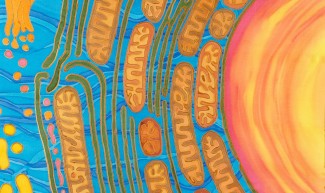Apathy, a pathological absence of motivation and emotion, is a common symptom of many neurological and psychiatric diseases, such as dementia or depression. The ECOCAPTURE@HOME program, developed by researchers and clinicians at the Paris Brain Institute, aims to establish a precise diagnosis of apathy and to set up personalised care for patients.
Apathy is the most common neuropsychiatric symptom in neurodegenerative diseases such as Alzheimer's, Parkinson's or fronto-temporal degeneration. It is associated with greater cognitive impairment and an overall deterioration in the quality of life of patients and their carers. Indeed, this pathological loss of motivation makes daily activities a real challenge.
Drug treatments for apathy, mainly antidepressants, show only moderate effects. Non-medicinal approaches such as psychotherapy require a very precise assessment of the degree of apathy in each patient in order to propose personalised treatment and hope for an improvement in symptoms.
Define and assess apathy is far from obvious. Apathy can take many different forms and clinical assessment scales are biased by the subjectivity of the evaluator, usually the patient themselves or their carer
The ECOCAPTURE programme, led at the Paris Brain Institute by Bénédicte Batrancourt (Inserm) and Richard Lévy (AP-HP/Sorbonne University), aims to develop new approaches to measuring apathy. It has recently defined several forms of the behavioural variant of frontotemporal dementia (FTD), through evaluation in the functional exploration room of the PRISME core facility.
In order to be as close as possible to the real-life conditions of patients, one of the objectives of ECOCAPTURE is to bring its assessment tools directly to their homes. This study, ECOCAPTURE@HOME, has been set up to validate a method for monitoring apathy at a distance. To do this, the researchers and clinicians at the Brain Institute wish to recruit 40 patient-caregiver pairs, 20 for Alzheimer's disease, 20 for the behavioural variant of FTD, and 20 control subjects without pathology. The data will be acquired using a connected watch and questionnaires on a smartphone application.
Our objective is to validate the relevance of our measurement method based on three behavioural markers of apathy: daytime activity, sleep quality and the emergence of emotions. If the results are positive, ECOCAPTURE@HOME could enable a better diagnosis of apathy in order to implement personalised management in the daily lives of patients
The Paris Brain Institute thanks the Malakoff Humanis group for its support of the Ecocapture project.
Sources
https://pubmed.ncbi.nlm.nih.gov/34360133/
ECOCAPTURE@HOME: Protocol for the Remote Assessment of Apathy and Its Everyday-Life Consequences. Godefroy V, Levy R, Bouzigues A, Rametti-Lacroux A, Migliaccio R, Batrancourt B. Int J Environ Res Public Health. 2021 Jul 2







